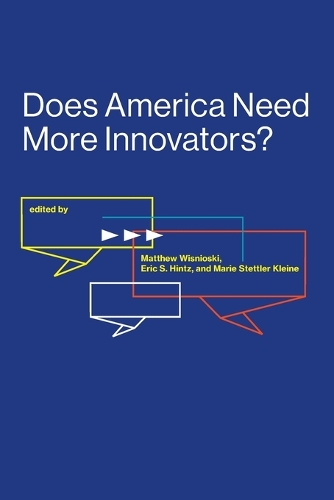
Does America Need More Innovators
(Paperback)
Publishing Details
Does America Need More Innovators
By (Author) Matthew Wisnioski
Edited by Eric S. Hintz
Edited by Marie Stettler Kleine
Contributions by Matthew Wisnioski
Contributions by Humera Fasihuddin
Contributions by Leticia Britos Cavagnaro
Contributions by Mickey McManus
Contributions by Dutch MacDonald
Contributions by Errol Arkilic
Contributions by Maryann P. Feldman
MIT Press Ltd
MIT Press
9th April 2019
United States
Classifications
Professional and Scholarly
Non Fiction
Entrepreneurship / Start-ups
303.4840973
Physical Properties
Paperback
410
Width 152mm, Height 229mm, Spine 17mm
Description
A critical exploration of today's global imperative to innovate, by champions, critics, and reformers of innovation.Corporate executives, politicians, and school board leaders agree-Americans must innovate. Innovation experts fuel this demand with books and services that instruct aspiring innovators in best practices, personal habits, and workplace cultures for fostering innovation. But critics have begun to question the unceasing promotion of innovation, pointing out its gadget-centric shallowness, the lack of diversity among innovators, and the unequal distribution of innovation's burdens and rewards. Meanwhile, reformers work to make the training of innovators more inclusive and the outcomes of innovation more responsible. This book offers an overdue critical exploration of today's global imperative to innovate by bringing together innovation's champions, critics, and reformers in conversation. The book presents an overview of innovator training, exploring the history, motivations, and philosophies of programs in private industry, universities, and government; offers a primer on critical innovation studies, with essays that historicize, contextualize, and problematize the drive to create innovators; and considers initiatives that seek to reform and reshape what it means to be an innovator. Contributors Errol Arkilic, Catherine Ashcraft, Leticia Britos Cavagnaro, W. Bernard Carlson, Lisa D. Cook, Humera Fasihuddin, Maryann Feldman, Erik Fisher, Beno t Godin, Jenn Gustetic, David Guston, Eric S. Hintz, Marie Stettler Kleine, Dutch MacDonald, Mickey McManus, Sebastian Pfotenhauer, Natalie Rusk, Andrew L. Russell, Lucinda M. Sanders, Brenda Trinidad, Lee Vinsel, Matthew Wisnioski
Author Bio
Matthew Wisnioski is Associate Professor of Science, Technology, and Society at Virginia Tech and the author of Engineers for Change- Competing Visions of Technology in 1960s America (MIT Press). Eric S. Hintz is Historian at the Smithsonian Institution's Lemelson Center for the Study of Invention and Innovation at the National Museum of American History. Marie Stettler Kleine is a PhD candidate in Science, Technology, and Society at Virginia Tech. Matthew Wisnioski is Associate Professor of Science, Technology, and Society at Virginia Tech and the author of Engineers for Change- Competing Visions of Technology in 1960s America (MIT Press). Beno t Godin is a Professor at the Institut national de la recherche scientifique, Montreal. Eric S. Hintz is Historian at the Smithsonian Institution's Lemelson Center for the Study of Invention and Innovation at the National Museum of American History. David Guston is Professor and Founding Director of the School for the Future of Innovation in Society at Arizona State University, where he also serves as Codirector of the Consortium for Science, Policy, and Outcomes.. Matthew Wisnioski is Associate Professor of Science, Technology, and Society at Virginia Tech and the author of Engineers for Change- Competing Visions of Technology in 1960s America (MIT Press). Eric S. Hintz is Historian at the Smithsonian Institution's Lemelson Center for the Study of Invention and Innovation at the National Museum of American History. Marie Stettler Kleine is a PhD candidate in Science, Technology, and Society at Virginia Tech.
